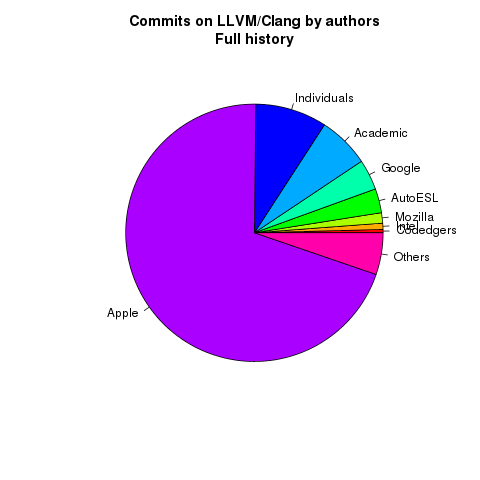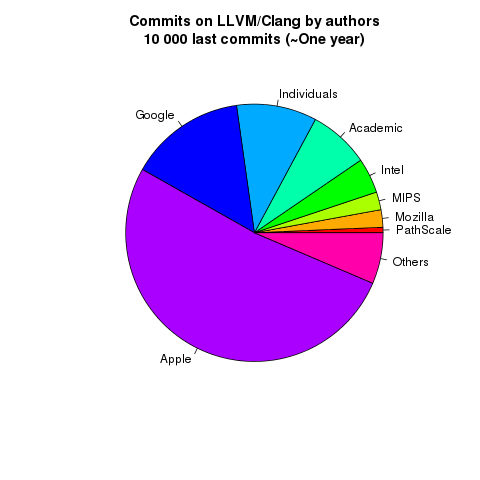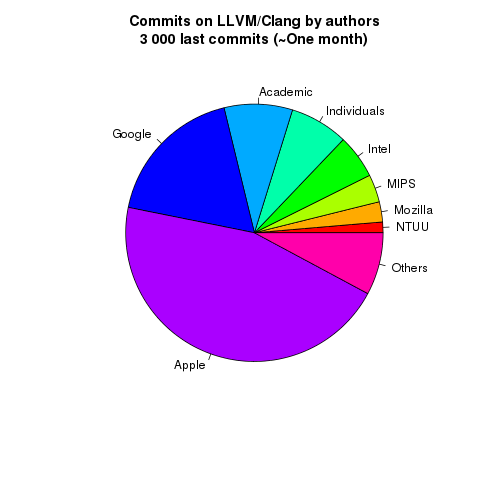Who is in control of LLVM/Clang ?
Juillet 22nd, 2012During my various chats and presentations on LLVM/Clang, one of the common criticism on LLVM/Clang is about the Apple's (supposed?) control on the platform.
Even if I am not concerned by this concern, here are some statistics about the development. Basically, I used the git history to build a list of all the author. If domain names were clear (ex: @google.com, @apple.com, etc), I used them for the paternity of the commit. If there were not clear (ex: @gmail.com, @me.com), I dig on the web to find the employer (Linkedin was my friend).
Of course, identifying individuals are pretty tough. Their percentages can be considered as a minimal figure.



To sum up, we can easily see that the percentage of contributions of Apple is decreasing over the time.
However, we all know that the number of commits is not the best metric to measure the control of one on a project.
Source: Processed data (please contact me in case of mistake)
Interview in FLOSS for Science
Juillet 20th, 2012A couple weeks ago, I have been interviewed by the news site "Free Libre open source software for science and engineering" about Scilab and my work in Scilab Enterprises.
I am happy to share it:
http://www.floss4science.com/scilab-an-interview-with-sylvestre-ledru/.
llvm & clang 3.1 in Debian unstable + GSoC
Mai 24th, 2012Released a few days ago, I am happy to announce that LLVM and clang 3.1 are already available in the Debian archive in Unstable. RC versions were already available for the last few weeks in Debian experimental. They are very likely to be part of wheezy.
We will soon try a new rebuild of the Debian archive with the version 3.1.
Talking about clang, a couple of months ago, I proposed a GSoC project to extend the Debian infrastructure in order to use clang instead gcc to build Debian packages. The goal is not to replace gcc but it is more about building packages with a new compiler.
With Paul Tagliamonte as co-mentor, Alexander Pashaliyski is going to work during the summer on this subject.
The final deliverables should be:
- Build services modified to be able to use clang instead of gcc/g++
- Integration into the Debian infrastructure (buildd.d.o, and similar services)
- An easy way to switch of compiler between gcc/g++ and clang
- A way to build a package with a different compiler (gcc, clang, intel compiler, etc)
- Time permitting, a fully clang-built Debian installation
For now, Alexander is working on an installation of the wanna-build and buildd services in order to have a dedicated testing environment.
Report from the BSP in Paris
Mars 2nd, 2012From February 17 to 19th 2012, between 10 to 30 hackers met at IRILL's offices to squash as many bugs as possible for the Wheezy release.
Besides about 42 pizzas, more than one hundred bugs (104 to be precise) have been fixed. Among them, 18 of them were fixed by removing old/unmaintained/deprecated packages from the Debian archive.
In a great atmosphere, one of the most important achievements of this BSP was that Yada, a deprecated packaging helper, finally passed away thanks to the efforts of Cyril Brulebois.
Thanks for all the contributors for making of this week end a success.
java-package: Replacement of sun-java6
Février 29th, 2012Back in October 2011, I blogged about the removal of the sun-java6 package from the Debian archive.
Even if Openjdk 7 is just great, some corporations still need to use the non-free sun-java6 packages.
For perform this task, Cédric Pineau and I brought back an old package from the archive called java-package.
From the upstream release, for example jdk-6u*-linux-x64.bin (which the user will have download since Debian is no longer allowed to redistribute it), the command
make-jpkg ~/Downloads/jdk-6u31-linux-x64.bin
will generate a .deb which can be installed in the packaging system.
Obviously, new upstream releases will NOT be automatically updated.
This is far from perfect but it is temporary solution until everybody switch to the OpenJDK.